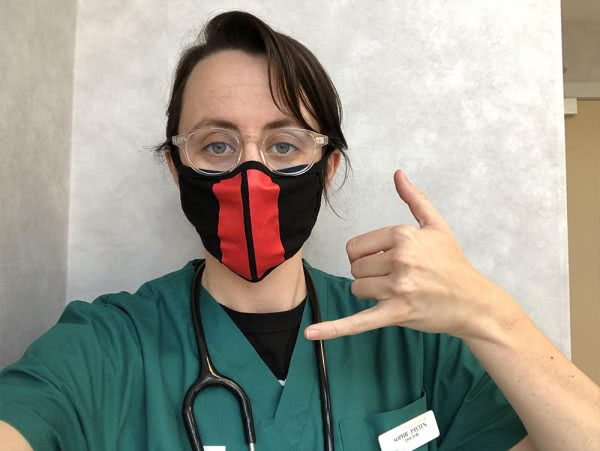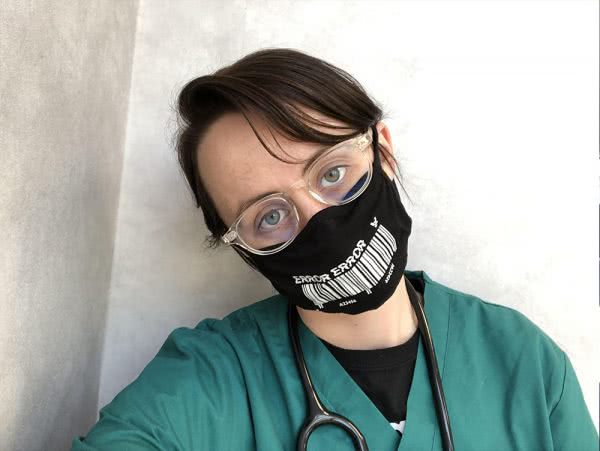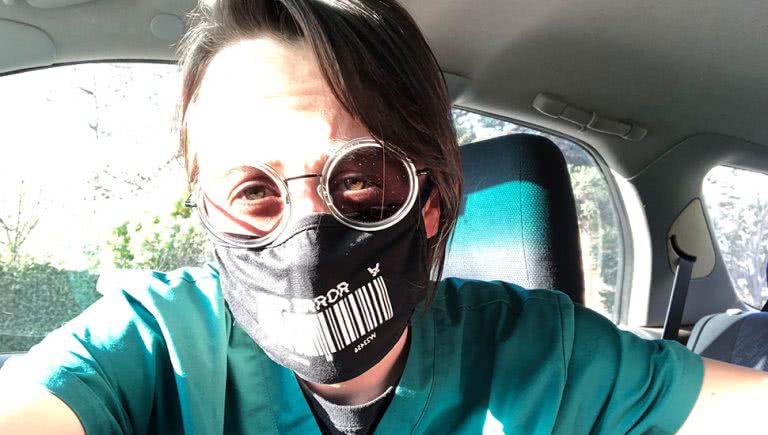Gordi quit her healthcare job and then an unprecedented pandemic happened. In terms of dark ironies, it was a cruel one.
After undertaking the stressful balancing act of study and music for years, Gordi – real name Sophie Payten – made the decision to quit her role as a junior doctor to pursue music full-time. Then COVID-19 arrived in March, and our world – and hers – was irrevocably altered again.
Her new album Our Two Skins was released to acclaim just after Gordi returned to her old job, offering her services to the COVID-19 frontline. The balancing act has returned, more extreme than ever. We caught up with Gordi to discuss her new album, her impressions of the COVID-19 crisis, and Australia’s position in it.

Tone Deaf: How’s isolation going? Where have you been based?
Gordi: It’s been ok. I’ve been in Melbourne for most of the time and back and forth a little bit from New South Wales to Victoria. I’ve been here (Melbourne) for the last couple of months doing medical work.
TD: You only just quit your medical work on January 31st to pursue music full-time. How strange was it returning so soon after?
Gordi: It’s been quite strange! I flew back from Europe in March after playing some shows and I put my name down and I put my name down with a few of the health initiatives, spare doctors and stuff like that. I was expecting to get the call-up but Australia started to flatten its curve and so I could focus solely on music and put this album. Then things kicked off in Victoria again over these past few months!
So I finished the couple of months around my album release and all the stuff that comes with that and came back to Melbourne. I’ve just been doing shifts now and then, filling in gaps. A lot of medical people have been furloughed due to exposure (to COVID-19) and they have to stay home for two weeks meaning the hospitals are short-staffed. So someone like me comes in and just fills that space.
TD: Has it been busy on the frontline?
Gordi: It has been. Especially as a junior doctor you have those days where you go from 7am to 4pm and you haven’t had a moment to pee or take a breath. So it’s been pretty crazy. Little things have changed, like where I normally go and just stick a needle in somebody, now I have to put the head-to-toe PPE on and you’re sweating and your breathing is fogging up under your mask. Everything’s just that little bit harder.
Check out ‘Extraordinary Life’ by Gordi:

TD: So you’re originally from the small town of Canowindra. Have you had a chance to go back there much?
Gordi: Not really, no. I’ve been there a couple of times this year. I’m actually going there in a couple of weeks. I’ve got a few shows in New South Wales and Queensland in October. I’ve been contracted to do bits and pieces of work in Victoria but it’ll be nice to get a little break from the frontline and go home.
TD: You also come from a big Catholic family. How hard has it been being away from them then?
Gordi: It’s been really hard! I’ve got lots of aunts and uncles and cousins. I’ve got three siblings, all of whom of their partners are pregnant so I’ve got three nieces or nephews coming. I’ve got two nephews already who I can’t see as much as I’d like. Being down south of the border has really been the toughest part about it. I think everyone’s making huge sacrifices at the moment, even people in the same cities aren’t able to see their families. I just hope there’s an end to all this! I think this time next year we’ll be in a very different place.
TD: What do you think about Dan Andrews and the stricter lockdown of Melbourne and Victoria? Do you agree with it?
Gordi: I do, I do. I think the data and evidence shows there’s really no other way to curb the spread. We’ve seen such clear examples from around the world of what would happen if we didn’t curb the spread. If you look almost anywhere else the healthcare systems are being brought to their knees.
If someone has a heart attack in the community, in Australia fortunately they can get into the hospital and give them the best chance. If the hospital was plagued by COVID-19 though, that person who’s had a heart attack is struggling. That just seems like a crazy thing in a developed nation to even consider.
Having said that, the economic and the mental health cost is huge. I think while the government imposes this strict lockdown they have to take measures to help, like with the extension of jobseeker and jobkeeper payments. The Victoria government has a mental health plan so that if you go to your GP you can get 20 free sessions with a psychologist. I think measures like that are the beginning of the hard work that is needed to curb hard mental health crises.
TD: Ziggy Alberts said a few things online in June, spreading misinformation, and you were one of the first public figures to respond.
Gordi: Look, to quote from Spiderman, “with great power comes with great responsibility”! And with 200,000 followers, that comes with a great level of responsibility. I think that there is always room for opinion and free speech but spreading misinformation that has no evidence behind it is damaging.
There’s been so many ethical dilemmas that have been brought to the forefront this year and the one that has steamrolled over the rest is the ‘greatest good’ thing. We’ve all made such individual sacrifices to curb the spread, to stop hospitals getting overrun, to stop elderly people from dying, to ensure people getting the best medical care. So for individuals to start spreading information with no evidence that will directly lead to people ignoring public health advice and lead to those policies not working and people getting COVID-19, I just have no time for that.

TD: Well as someone involved in healthcare, how important is wearing a face mask?
Gordi: It’s incredibly important. I think it’s an interesting issue because they’ve become a political and social tool. In America particularly but fortunately in Australia it seems like the majority of people are just doing it and it’s only a small group of ill-informed people who are coming out against it. I think that there’s evidence and science that wearing face masks decreases your likelihood of catching it and spreading it (COVID-19). Then you look at the people who were marching in the protests (BLM marches), a congregation of thousands of people, and the spread from that event has actually been really small. I think a large part of that is because of people wearing face masks.
TD: From what you’ve seen in Melbourne, then, people have been following the orders?
Gordi: I think in Victoria definitely. If you look at social media, it seems like the rest of Australia are leading a relatively normal life, except not really making any plans in advance. I think in Victoria, there’s a real community spirit here now. Everyone’s just knuckling down and everyone is feeling crap but it’s the only way. People have learned how to adjust their lives in the hopes it won’t last forever.
TD: How strange was it releasing your new album Our Two Skins in the middle of an unprecedented pandemic?
Gordi: It was pretty weird! I think we adapted to it quite quickly. We just had to come up with creative ways to reach our audience. Social media became more critical than ever to make that connection. We saw the huge rise in bedroom sessions on Instagram Live at the start. That seems to be dying out though, the quality of it isn’t always that high! You’re not really getting paid for it which can be problematic.
I think it’s opening up to do these livestreams where people are paying to see it and that then means you can spend more time and money on giving a better quality product. I think there’s exciting innovations in that respect. Our campaign went from madly touring for the rest of the year but that’s not happening! Now, we have to think about how we can keep reminding people of this record and keep it out in people’s attention.

TD: Are there any differences between Our Two Skins and your previous record Reservoir?
Gordi: The differences were enormous. Simply from a maximalist versus minimalist point of view, the first record was much bigger and it was heavily layered and it had a lot of strings and it had horns. It was like a Belgian chocolate, whereas Our Two Skins was more straight up plain chocolate probably! I didn’t want anything too artsy, the bells and whistles, I didn’t want anything overly fancy. I just wanted to communicate the story and the narratives behind the songs. So we sat there looking at what we had and wondered what was the bare minimum we have to put in this album in order to convey this message. Whereas with Reservoir it was very much about how much we could layer it. So it was an interesting diversion (on Our Two Skins) and I learned a lot from doing it.
TD: When was Our Two Skins written and recorded?
Gordi: The whole thing was really written around the end of 2017 and the summer of 2019. I finished writing the top of the album in New York in 2018 and then we recorded it in the space of a month in 2019.
TD: There’s a couple of songs that seem prescient now, even though they were written before COVID-19. ‘Aeroplane Bathroom’, with its sense of overwhelming anxiety.
Gordi: Yeah, that’s the main theme of the record. It features more mental health stuff than I’ve ever dealt with before. I think that was all pretty relevant to what I was doing, touring and singing in my life. It proved great writing material. I wrote it and the other songs when I was kind of right in the eye of the storm of a panic attack or big feeling of anxiety. It was interesting then coming back to re-record some of the stuff when we made the album and step back into that space. Mentally I’d moved through the mental health stuff but when you record you’ve got to go back into that mindset again.
Check out ‘Aeroplane Bathroom’ by Gordi:

TD: The other one was the lovely ‘Sandwiches’. I think a lot of people will really relate to its theme of losing a loved one, especially just now.
Gordi: That’s being really nice, having a lot of people reach out. I wrote that about my grandmother, who I was very close with. It’s been amazing just hearing from people who say how much it reminds them of their grandparents, how they lost a grandparent and how they stay connected to them. It seems like that will forever be universal.
TD: Since you’ve started pursuing music more, do you think that you’re still helping people, emotionally instead of physically?
Gordi: It’s interesting because I do this career, medicine, and I always thought that it focuses more on other people than yourself. You’re sitting opposite someone and they’re pouring their heart out to you and you’re synthesising that information and giving it back to them and hopefully helping them. I’d always thought of music as much more selfish and insular. It’s much more about me and my life.
Yet funnily enough, through music you end up reaching more people quickly and helping people more quickly than you can physically do as a medical person. I think in making this record, that was a genuine hope of mine, being incredibly honest about what was happening to me in my life and people would find a lot of solace in that.
TD: Was there an artist that really made you decide to focus on music over medicine?
Gordi: Yeah there was (laughs). It was Missy Higgins. I got The Sound of White, her debut album, in 2004 and got a guitar and I worked my way through that album. Then her second album On a Clear Night came out in 2007 and I remember listening to it in the library. I think in 2012 her third record came out (The Ol’ Razzle Dazzle) and I went to see her in Sydney and I was sitting in the audience and she was playing ‘Any Day Now’ from her first record and I just was like “this is what I have to do”! It was a real lightbulb moment. The way I was feeling at that moment, that’s what I knew I wanted to find again.
TD: To circle back to COVID-19, how do you think Australia has handled it compared to somewhere like Britain or America?
Gordi: I think the messaging from the government has been pretty clear and concise. I think the leadership of each state government has, for the most part, been really commendable. I do think the bickering between states has been a bit much! I think the weak political points being made have really started to annoy me. It’s totally unnecessary. I think we’re really lucky because when push came to shove, we had people who were willing to stand up and make unpopular decisions. And when compared to somewhere like America, which has been a bloody disaster, we’re very lucky!
TD: When do you foresee, especially for Victoria, being out of strict lockdown and things hopefully getting better?
Gordi: Hopefully by December, Victoria will look a little bit more like the rest of Australia. Unfortunately I don’t think I’d be surprised if after Christmas there’s another breakout because everyone’s going to want to see everyone. I think we’d be lucky to not go into another lockdown if that’s the case. I’ve been listening to Bill Gates, who’s involved in Infectious Disease control around the world, and I believe him when he says that by the end of next year the vaccine coverage will be widespread enough that the virus will be brought to a halt.
Check out ‘Sandwiches’ by Gordi:


































